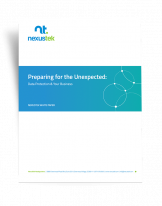Can You Spot a Phishing Email?
Identifying potential threats are vital for an organization’s proactive security and data management measures.
Test Your Skills Against Email Scams
Phishing emails are one of the top and most debilitating tactics in infecting enterprise networks. It starts as an innocent looking email, from a company that you may do business with such as UPS or your bank. Once the email is opened and embedded links are clicked, the device and potentially the network is infiltrated. This can cause an enormous amount of loss in business productivity and expense, as it paralyzes your infrastructure. Until your IT support team can locate and isolate the virus, expect frustrating down time. To hunt down the entry point of the email and remove, tech teams need to systematically disconnect all devices from the network and scan them with the latest anti-virus program. And the larger your company, the longer the process will take.
Take the Phishing Quiz!
The Phishing epidemic is startling as is the inability to recognize Phishing attempts by users. McAfee Labs reports 80% of business users are unable to detect scams. In fact, results showed that finance and HR departments, which hold sensitive corporate data, performed the worst.
McAfee Labs reported nearly one million new phishing URLs sites in the past year. Not only was there an increase in total volume, there was a significant rise in the sophistication of phishing attacks occurring in the world. Results showed both mass campaign phishing and spear phishing are still rampant in the attack strategies used by cybercriminals around the world. Meanwhile, the United States continues to host more phishing URLs than any other country.
The quiz below is a great way to safely test your skill in evaluating legitimate emails from virus scam emails. As Phishing proliferates, and becomes more deceptive and lucrative each year, NexusTek is committed to protecting our clients with effective anti-virus such as McAfee, along with education and raising awareness of what scam emails look like, helping users avoid costly mistakes.






